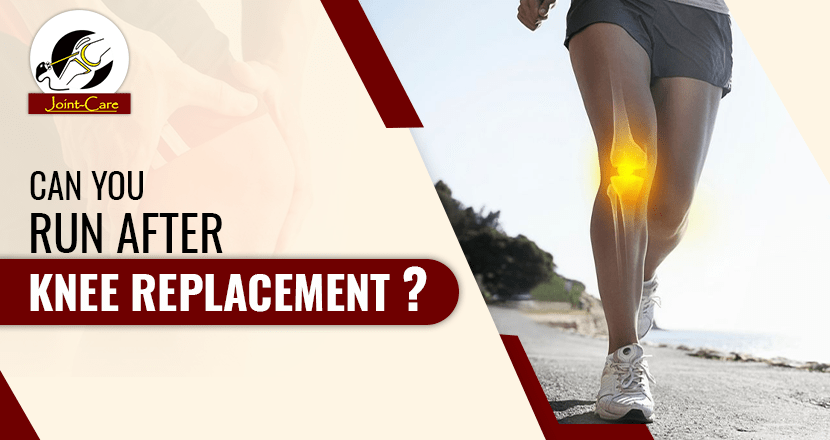
Knee replacement surgery, a transformative medical procedure designed to alleviate chronic knee pain and restore mobility, has become a beacon of hope for countless individuals. This surgical intervention involves replacing damaged or deteriorated knee joint components with artificial implants, aiming to grant patients a new lease on life. Dr. SS Soni is a highly regarded Best Orthopedic Doctor in Jaipur, known for his expertise in knee replacement surgery.
Can you run after knee replacement?
A knee replacement surgery is a topic that generates both hope and concern for many patients. Knee replacement, a procedure aimed at alleviating pain and improving mobility, involves the replacement of damaged knee joint components with artificial implants. The feasibility of running post-surgery depends on various factors, including the patient’s preoperative fitness level. These risks include implant wear, instability, and fractures, which should not be underestimated. Depending on one’s unique circumstances and health status, alternative low-impact exercises like walking, swimming, or cycling may be recommended. Ultimately, the ability to run after a knee replacement varies from person to person, emphasizing the importance of a personalized approach to recovery that balances the desire for physical activity with the need to protect the integrity of the replaced joint.
Precautions to Take During Running
Engaging in running after a knee replacement can significantly contribute to maintaining an active lifestyle and enhancing overall well-being. Nevertheless, this endeavor must be approached with a judicious blend of enthusiasm and caution to safeguard the integrity of the newly replaced knee joint. Let’s explore these precautions in depth to ensure your journey towards running post-surgery is both fruitful and safe.
- Start Slowly: Resuming running after a knee replacement should be a gradual process. Commence with walking and progressively transition into running as your body adapts to the heightened physical demands. This gradual approach serves two crucial purposes. It minimizes strain on the knee joint by incrementally exposing it to the increased impact and pressure of running. Simultaneously, it allows you to build strength and endurance over time, promoting a healthier and more resilient knee.
- Wear Appropriate Footwear: Investing in high-quality running shoes with excellent cushioning and support is a non-negotiable aspect of post-surgery running. Proper footwear plays a pivotal role in ensuring your safety and comfort while running. These specialized running shoes offer effective shock absorption, stability, and cushioning, thereby reducing the strain on your knee joint. Additionally, they help prevent any undue strain or discomfort during your runs.
- Listen to Your Body: Vigilance towards your body’s signals is paramount when running post-knee replacement. Be acutely aware of any signs of discomfort or pain during or after your run. Should you experience persistent pain, swelling, or unusual sensations in your knee, it is essential to halt your activity immediately. Providing your body with time to rest and recover is crucial in preventing potential complications and setbacks in your post-surgery rehabilitation.
- Avoid High-Impact Activities: Although running is generally feasible after a knee replacement, it is wise to steer clear of high-impact activities that could place excessive stress on your knee joint. Activities such as sprinting or running on hard surfaces can be particularly demanding on your knee. The high impact involved in these activities may strain your knee joint and potentially compromise the longevity of your prosthetic knee. Opting for softer terrains or selecting low-impact running alternatives, such as jogging on trails or using a treadmill with cushioning, significantly reduces the strain on your knee joint and enhances your overall running experience.
- Other Tips to Follow: Maintaining a balanced diet rich in essential nutrients is crucial to support overall joint health and the healing process. Adequate nutrition ensures that your body receives the necessary building blocks for optimal recovery. Staying well-hydrated is equally important, as dehydration can increase the risk of muscle cramps and joint discomfort during your runs. Before you embark on your run, engage in a thorough warm-up routine to prevent muscle and joint injuries.
- Physical Therapy: Considering participation in a structured physical therapy program can be highly beneficial. Physical therapists can design exercises tailored to your unique needs, focusing on strengthening the muscles surrounding your knee joint and enhancing flexibility. Physical therapy plays a crucial role in ensuring that you build strength while safeguarding your knee joint, thus promoting a successful return to running.
- Rest and Recovery: Providing your body with ample time to recover between running sessions is fundamental. Adequate rest is vital for preventing overuse injuries and facilitating the healing process. It’s essential to incorporate scheduled rest days into your running routine. During these rest periods, your body has the opportunity to repair and strengthen, reducing the risk of overuse injuries and ensuring that you can continue your running regimen safely in the long term.
- Consult with Your Doctor: Before embarking on a running regimen after knee replacement surgery, consulting with your orthopedic surgeon is imperative. Orthopedic surgeons possess comprehensive knowledge of your specific case, the nuances of your surgery, and your health status. During this consultation, your surgeon can provide personalized guidance on when and how to safely reintroduce running into your routine.
Reach Dr. SS Soni for knee replacement surgery in Jaipur!
Dr. SS Soni is a highly regarded Best Orthopedic Doctor in Jaipur, known for his expertise in knee replacement surgery. With a distinguished career spanning several years, Dr. SS Soni has earned a reputation for providing exceptional care and innovative solutions for individuals suffering from knee joint ailments. He specializes in knee replacement procedures, offering both partial and total knee replacements to patients seeking relief from chronic knee pain and limited mobility.
